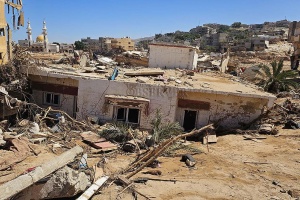By Youssef Lutfi, a political writer
Bathily gives a mercy shot to 6 + 6 talks

The UN envoy to Libya, Abdoulaye Bathily, on 19th June, gave a briefing on the developments of the political situation in Libya, during an open session of the UN Security Council. The most important part of his briefing was that the political process in Libya reached ‘once again a critical phase’ and that the discussions of the 6 + 6 committee were not sufficient to resolve the main contentious issues to enable elections to take place. He further stated that consensus on electoral laws cannot be achieved through a legal framework only, but rather requires a new political agreement.
Speaking on security developments, Bathily said, "Tripoli has remained relatively stable during the past period, but the ongoing government operations to combat smuggling and human trafficking activities in Zawiya and the surrounding areas may pose a threat to the relative stability in Tripoli, due to allegations that the strikes are being used politically."
Bouznika is stripped
As the Arab saying goes ‘The mountain labors and brings forth a mouse’, after months-long discussions, the Bouznika meetings between representatives of House of Representatives (HoR) and the High Council of State (HCS) produced a legal basis which is said to be flawed, to say the least. Starting with the appeals mechanism that will lead the electoral process to a definite collapse, to the requirement to synchronize the parliamentary and presidential elections (the second round) and hedging the legitimacy of the results of the parliamentary elections on the presidential elections! and ending with the defective formulations and the violation of the confidentiality of voter data, as well as the legal rule agreed upon between HoR and the HCS, all represent a definite recipe for failure.
The UN envoy's criticism of these problems was clear in his briefing, and his talk about the failure of the 6 + 6 committee, and the need to reach a new political agreement, clearly indicated Bathily's dissatisfaction with the two wings of the legislative authority, especially in the light of his previous statements about the possibility of bypassing these bodies and forming a committee that includes other parties to undertake the task of preparing an electoral base - a task which the National Dialogue Forum Committee previously failed.
Bathily's briefing, in light of his previous statements, provoked disapproval and indignation of members of HoR and HCS, as the media witnessed an influx of statements of condemnation and denunciation during the past few days, the most prominent of which was the statement of Aqila Saleh at a joint press-conference with the Speaker of the Egyptian Parliament, Hanafi Jabali, that Bathily "is not a ruler" of Libya to instruct him to form committees, and that the mandate of the UN mission is to “support, and not formation of committees.”
Statements of HoR and HCS reveal the strained relationship with the Senegalese diplomat, whose briefing came to put an end to the allegations of full agreement announced by the HoR and the HCS, and to reveal the futility of the Bouznika talks, and to act as a mercy shot for the upcoming election project.
The government, a legitimate project
Bathily's criticism of the outputs of Bouznika and the 6 + 6 committee did not spare the Government of National Unity its share of criticism, as Bathily alluded to it in his briefing directly and indirectly. On the one hand, the envoy levelled a direct criticism of the military campaign led by the government west of Tripoli against the smuggling and human trafficking gangs, holding such campaign responsible for undermining stability, and the relative enjoyment of stability in Tripoli and the western region under the rule of the smuggling cartels. The envoy also indicated the possibility of bypassing the government in the context of his review of the major problems and the need to overcome them through a new political agreement, on top of which comes the formation of a mini-government that will undertake the preparation of the elections project.
Bathily made it clear in his briefing, that the Libyan political parties are either complicit in thwarting the election project or failing in making it a success, but as usual, the UN envoy did not fulfill the promises he made upon his arrival and did not provide any logical and objective remedies or approaches targeting the real root causes of the crisis.
Circle of futility and failure
The Libyan scene has revolved around a circle of failed political understandings for almost 8 years. Since the launch of the Skhirat Accord and its complications, through the understandings of Paris, the first and second Berlin conferences, and then finally the Geneva agreement, the international parties overseeing the "political process" have not succeeded in ending the state of the political impasse, but the crisis is getting worse and more complicated with every new agreement.
Bathily's failure to address the political impasse is not a personal failure of the UN envoy as much as it is an extension of the international and UN tampering that has continued since 2015, as the international political approach to the Libyan crisis goes beyond the real causes of the crisis to jump on technical problems or political complications resulting from prior understandings - the Sukhirat Accord as an example - Bathily, who confined the causes of the current impasse to the issues of consensus around the election law, ignoring a small detail, which is subjecting the HoR - in terms of legitimacy it is dissolved legal wise - to the influence of a general who turned against the constitution and dominated the country's oil resources with the support of mercenaries and foreign powers.
Ignoring the actual causes of the crisis was and still is the policy of the UN mission, starting with Bernardino Leon all the way to Abdoulaye Bathily, and in light of the corruption of the Libyan parties and their benefit from the continued state of impasse and political conflict, it is not expected that the country will emerge from the cycle of absurdity and failure without the existence of a conscious popular movement that regains the scene from the hegemony of corruption and futility.
Disclaimer: The views and opinions expressed in this article are those of the writer, and do not necessarily reflect those of the Libya Observer



